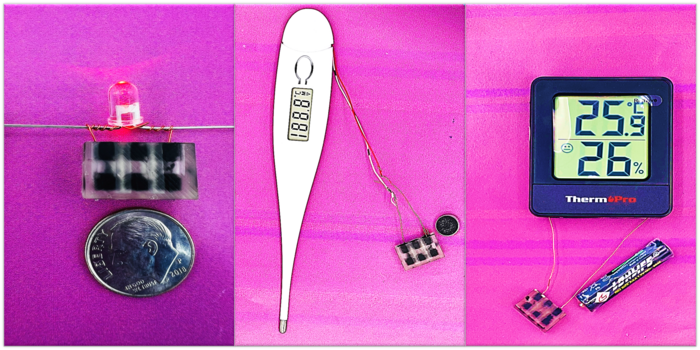Groundbreaking biobattery with 100-year shelf life runs on bacteria
Researchers have made a groundbreaking discovery in biotechnology by developing a biobattery that can still function after 100 years.

[Apr. 20, 2023: JJ Shavit, The Brighter Side of News]
Professor Seokheun “Sean” Choi and PhD student Maryam Rezaie have created a small biobattery that works on bacteria and potentially has a 100-year shelf life. (CREDIT: Seokheun “Sean” Choi)
Binghamton University researchers have made a groundbreaking discovery in biotechnology by developing a biobattery that can still function after 100 years. The new biobattery uses spore-forming bacteria that are similar to the ones used in their previous research on ingestible biobatteries that can be activated by the pH level of the human intestine.
Small-scale battery-like microbial fuel cells (MFCs) are a promising alternative power source for future low-power electronics. Controllable microbial electrocatalytic activity in a miniaturized MFC with unlimited biodegradable energy resources would enable simple power generation in various environmental settings. However, the short shelf-life of living biocatalysts, few ways to activate the stored biocatalysts, and extremely low electrocatalytic capabilities render the miniature MFCs unsuitable for practical use.
The findings of the research were published in the nanotechnology journal Small. The study focused on developing a microbial fuel cell that can be stored for an extended period without any degradation of biocatalytic activity, and can be activated rapidly by absorbing moisture from the air.
The researchers believe that the development of biobatteries could revolutionize portable and storable power generation capabilities. The researchers aimed to improve the power output, provide long-term storage of bacteria, and offer on-demand battery activation for rapid and easy power generation.
Related News
Professor Seokheun "Sean" Choi and PhD student Maryam Rezaie, from Binghamton University's Bioelectronics and Microsystems Laboratory, collaborated on the research.
Here, heat-activated Bacillus subtilis spores are revolutionarily used as a dormant biocatalyst that can survive storage and rapidly germinate when exposed to special nutrients that are preloaded in the device. (CREDIT: journal Small)
The researchers created a dime-sized fuel cell and sealed it with a piece of Kapton tape, a material that can withstand temperatures from -500 to 750 degrees Fahrenheit. After the tape was removed and moisture allowed in, the bacteria mixed with a chemical germinant that encouraged the microbes to produce spores. The energy from that reaction produced enough power to light an LED, a digital thermometer, or a small clock.
The battery-type MFC device is readily activated by moisture harvesting, producing a maximum power density of 0.4 mW cm−2 and a maximum current density of 2.2 mA cm−2. (CREDIT: journal Small)
According to the researchers, heat activation of the bacterial spores reduced the time required to reach full power from one hour to 20 minutes. Increasing the humidity led to higher electrical output. After a week of storage at room temperature, there was only a 2% drop in power generation.
While the study was funded by the Office of Naval Research, the researchers believe the technology could have significant civilian uses too. The biobattery has potential applications in remote areas where traditional power sources are unavailable, and it could be used in military applications to power devices on the battlefield.
A microporous, graphene hydrogel allows the adsorption of moisture from the air, moves the nutrients to the spores, and triggers their germination for power generation. (CREDIT: journal Small)
Professor Choi acknowledges that there is more work to be done to make biobatteries more powerful and to produce more voltage, but he believes the findings are a good start. He hopes to make a commercial product using the ideas developed in this research.
The development of biobatteries could lead to significant advancements in the field of biotechnology and provide a cleaner and more sustainable source of power.
Note: Materials provided above by The Brighter Side of News. Content may be edited for style and length.
Like these kind of feel good stories? Get the Brighter Side of News' newsletter.
Joseph Shavit
Head Science News Writer | Communicating Innovation & Discovery
Based in Los Angeles, Joseph Shavit is an accomplished science journalist, head science news writer and co-founder at The Brighter Side of News, where he translates cutting-edge discoveries into compelling stories for a broad audience. With a strong background spanning science, business, product management, media leadership, and entrepreneurship, Joseph brings a unique perspective to science communication. His expertise allows him to uncover the intersection of technological advancements and market potential, shedding light on how groundbreaking research evolves into transformative products and industries.



